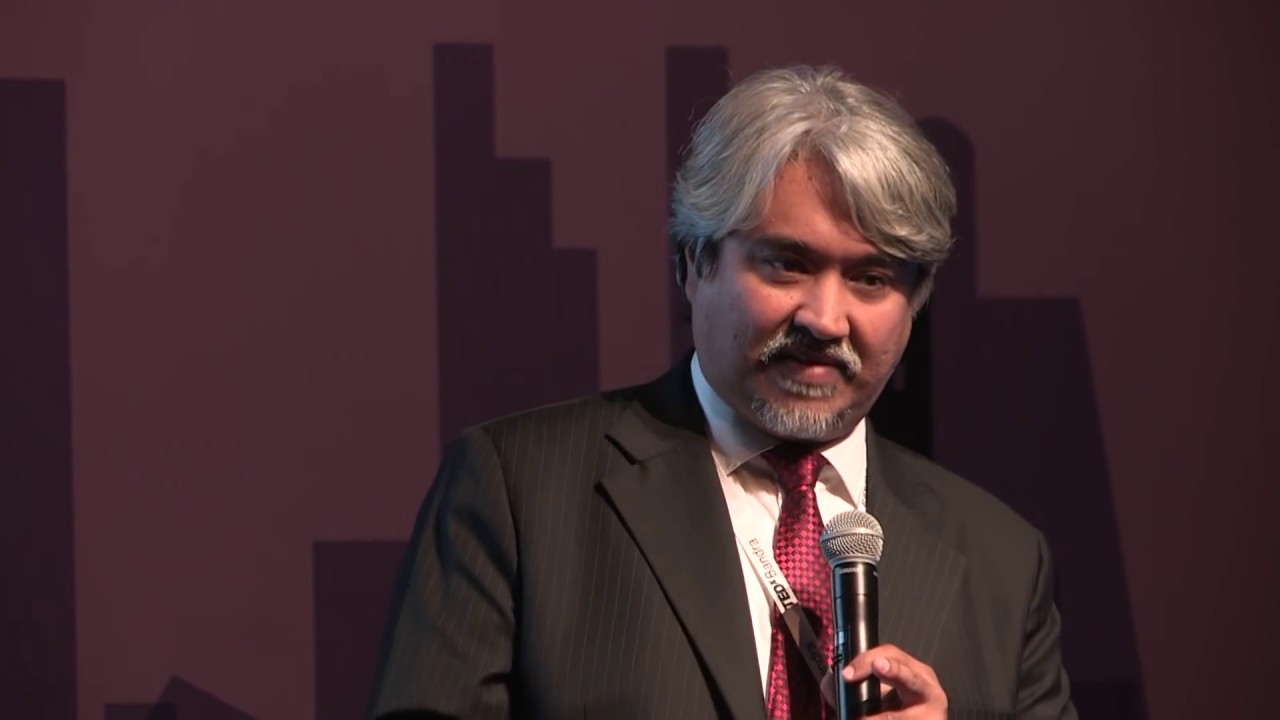AJEET KHURANA– India’s top Angel Investor, former CEO of IIT Bombay’s SINE, speaker at TEDx, a Mentor and the author of a textbook titled Information Technology for Retailing.
Alumnus of University of Texas, Ajeet Khurana had earlier founded Corpus Collosum Learning Pvt. Ltd and KITS (Khurana Information and Training Systems Pvt. Ltd). Having worked with various incubators, accelerators, venture funds like Kalaari Capital, entrepreneur clubs, Nasscom and social media platforms, besides National Entrepreneurship Network (NEN), he has been in the startup scene in India since 1993. He is an entrepreneur turned investor.
With two stints as an entrepreneur, both lasting exactly 6.5 years in the field of education and web publishing, Ajeet Khurana has seen quite a bit of the ups and downs of startups. As a lecturer at the University of Texas at Austin, he taught e-commerce back in 1993, when the term “e-commerce” had not yet been coined. An undergrad in computer engineering from the University of Mumbai, and an MBA from the University of Texas at Austin, Ajeet is presently a leading name in the startup ecosystem.
From starting two ventures as a solopreneur, to helping a large number of startups with their go-to-market, he has never shied from getting his hands dirty. At the same time, he has helped dozens of startups raise investment. He truly believes that small business owners are driving change in the world, and need to be facilitated as much as possible. Innumerable small businesses have gained from his attitude, vast professional networks, financial acumen and digital mindset.
As a shareholder, Ajeet Khurana was a part of Carve Niche Technologies, Rolocule Games, Witty Feed, Leaf Innovation, Avaz Inc, and many others.
In the following brief interview with Ajeet Khurana, we have managed to gain enough knowledge for a dedicated business enthusiast.
Que- What drifted you from being an entrepreneur to an Investor?
Ajeet- Honestly, it was not a deliberate choice. Way back in 1998 when dotcom bubble was at its peak, I was told by people that I will be obsolete because I wasn’t on the internet. Found a startup called padhai.com based out of Hyderabad and purchased a 5% ownership of it. The objective was not the investment, but to diversify. That was my first investment. Then the second one was in my friend’s company where he required support. Become a formal and active investor 12 years later, in 2010. And this decision was totally based on my relations with the entrepreneurs.
I am a proactive learner. Once I realize the importance of interpersonal relationships, I quickly invested myself into this business without looking back.
Que- How will you prioritize the following things if you have to invest in a start-up?
- Unique Idea/ Product
- Ultimate Strategy
- Right Time
- Great Team
- Grit of Founder
- Superb Execution
- Initial revenue
Ajeet- Every successful investor has a strategy to follow. They surely know what they are doing even if they don’t follow the same strategy, but the rules never change. It all comes to focus and experience. From my repetitive practice and knowledge, I would list the prerequisites in the following order:
- Right team
- Grit of Founder
- Superb Execution
- Ultimate Strategy
- Initial Revenue
- Unique Idea/ Product
- Right Time
Que- Since time plays a crucial role, how do you decide the right time to invest in a startup, to increase the return on investment?
Ajeet- If the only criteria were to increase the return on investment rate then we should go as early as possible. However, there is a counterbalancing factor of risk. The earlier you go the possibility of return is higher but the risk of failure is also higher. So the ideal time that both variables meet my requirements, the return as well as decreased risk of failure, when the product has gone to market, it has early revenue and it has somebody in the team other than just the founder. At least one hiring has occurred, few paying customers exist, and the product you’re offering (first version at least) is being deployed.
Related- Lokesh Tanwar’s 24 Hour Rule of Decision Making
Que- How do you judge the integrity and honesty of a founder who approaches you for an investment?
Ajeet- It’s a very important factor, second it is extremely difficult to assess. Try and talk to other people who know the concerned person. You have to engage with the founder multiple numbers of times. The target tends to be 10, but generally, it is not possible to meet the target, so, a minimum of 5 to 6 engagements, at least half of them being face to face should be there. Sometimes the discussion that takes place may not be about the startup. It could be about politics and he might start giving some prejudicial indicators but that is not foolproof and probably that’s just the 50% of the complete judgment. Usually, it is a one month or longer process.
Que- How do you valuate a Startup when it’s in the idea or prototype phase when you are looking into investment?
Ajeet- Very simple. I don’t! Because time has shown me that I have no ability to judge it at that initial stage because if you notice, out of the seven criteria for investing in a startup, I had put ‘unique idea’ on number 6. So, that tells you the amount of importance I give to the idea or prototype. Frankly, it is too arrogant of an outsider after just 5 or 10 meetings if he believes that he will understand the premise so I just stay away from that. Neither for investment not for mentoring do I start engaging with the startups at that stage.
Que- How can one make you highly excited by his or her business idea to take an investment from you?
Ajeet- There are two things, first of all, there are certain things you have to do without choice, and also there are other things you are keener to do. For example, if you ask my choice of business, I will give you one or two options. So, by chance, if some entrepreneurs need investment in those areas so automatically there is this initial chemistry. However, if somebody shows me that they have managed to acquire customers through creativity and hard work as opposed to expenditure then that is very exciting.
Que- How many slides you would like to see in a pitch presentation? How much time do you give to each pitch deck?
Ajeet- While on e-mail as well as in a personal meeting the entrepreneurs always show the pitch, and I don’t think I ever looked at it. Because the stage at which I approach the people, it is meaningless. Although there might be some slides in the pitch deck with numerical information such as competitor information, revenue growth or customer growth which I consider to be important. Rest I don’t place much value on the pitch deck.
Also, a time of 15 minutes should be given to any pitch deck for judging the business if approached for the first time.
Que- What clauses should an entrepreneur be aware of while signing a deal with an investor?
Ajeet- The interesting thing is while your question might be important, but there might not be a lot of opportunity for entrepreneurs. Especially, if you are going to an angel network or an institutional investor such as a venture capital firm. They may not be too flexible with their terms where entrepreneurs can negotiate. In light of that, there is ‘promoter buyback’ where the promoter has to guarantee some return, or terms which are extremely unfavorable to the previous investors of the startup. If either of these two is present then I think it is better to even shut the company down rather than go to such an investor.
Related- Founder’s Agreement- Importance and How to Make it
Que- What do you expect from the founders, when the startup is not performing well even after funding, as it is a situation of high pressure for both the founder and the investor?
Ajeet- The disappointment occurs when the Founder does not accept the responsibility and comes up with reasons and excuses. That is not tolerable in business terms. The most important aspect is that the founder is expected to behave in an accountable and responsible fashion.
Que- How does it feel when the start-up you have invested in does not perform?
Ajeet- There are two parts. First, at my level, I consider it as a mistake that I have made in terms of my assessment. There is a failure in my judgment, so I try to see what is there to learn so that I don’t make the same mistake again.
Second thing is when they fail there are two stages of failure. One is the early failure when things can be improved. In this case, the investor can jump in and check how they can help and second when nothing can be done. In the second case, I do not respond because by that time so much money and effort has already been wasted that now it is impossible to justify wasting even one more minute on it.
Que- What is your opinion on the so-called mentors who are providing ready-made solutions in their incubation centers instead of telling all the possible outcomes?
Ajeet- There are three levels of problems:
1. First of all, if there are 1000 mentors, there are 500 who don’t hold the capability to be a mentor and usually they talk very well so we are wrongly under the impression that they are good.
2. From the remaining 500, 90% don’t have the correct motivation, which means either they are doing to improve their LinkedIn profiles or even if they have a genuine intention that intention dries up after a month and they move to another exciting venture.
3. The remaining 50 might be fit and have the right intentions but they do not gel up with the entrepreneurs.
The very few 2-3% that are left are the real gems. Therefore even if the mentoring premise is strong enough, we don’t see good results in most cases due to lack of any of these three factors- capability, intent, and fit.
Que- Can people expect from you to be properly engaged?
Ajeet- Different mentors have different styles. I am a person with a light mentoring. I will not mentor until you want me to mentor you and I won’t find faults. You have to come to me. Mentoring is not advising. In my mentoring I do two things, I see if some important introductions such as new advisors, other mentors, customers or investors, can be made which give a tangible outcome. Second, if a person comes to seek judgment of his ideas, I won’t say what is right or wrong. I will be available like a sounding board only to give my reaction. Mentors trying to do twenty different things have a bigger challenge to face.
Que- What’s your opinion on the statement, “IITians and IIMians are ruining the game for everyone”?
Ajeet- First, I would like to tell that IITians are everywhere and IIMians are nowhere. IIM is not a factory for entrepreneurship, IIT is. They are viewed more favorably initially so they are making it tough for others but they are not ruining the market for sure.
Que- What is the best way to make an investor believe that you are the right person for this startup?
Ajeet- Just show results. Anything short of that, nothing can be done. Everything might sound perfect; everyone is watching the same motivational videos, gaining the same knowledge, people have become very much aware and knowledgeable about saying the right things. But what matters is doing it right. You can no longer say great things to make me believe you. You will have to do it.
Ajeet’s Advice to Investors- “If you are in to make a return on investment which is the reason you should be in for, then make sure you are choosing plans which are exit-able. Decisions should not be taken in haste just by liking an idea, not thinking if they will ever be able to come out of this. That creates a false sense of the future of that startup which leads to failure.”
Ajeet’s Advice to Entrepreneurs- “Just keep in mind why you became an entrepreneur. My reason to be an entrepreneur is that I want to be the architect of my own destiny and not depend on others. If you have the same reason, you will derive the outcome. You should focus only on the growth of your business, which is customer acquisition, product development etc. If you’re spending time on lots of conferences or seminars then you are just enjoying the idea of being an entrepreneur. Also, spend very minimal amount of time engaging with investors. If you have multiple founders, one co-founder can be given the job of outer engagements with investors but the primary focus should be the product and the customer.”




0 Comments